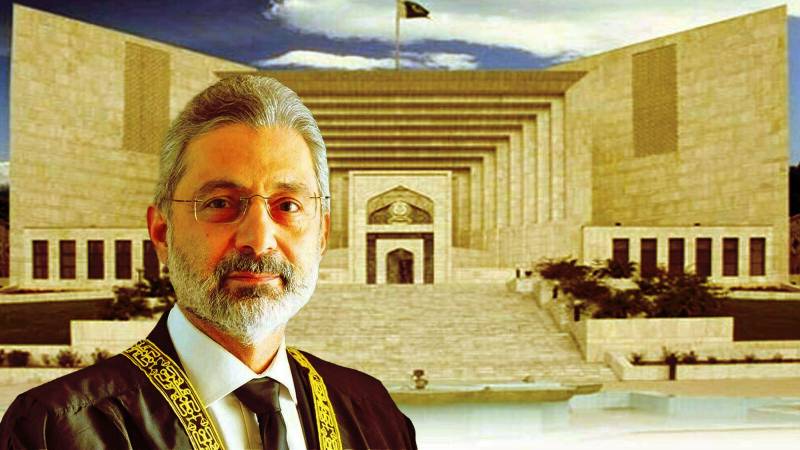
As many as 66 public sector universities in the country are currently headless, the Supreme Court was informed.
The Higher Education Commission (HEC) has submitted a document to the top court that there are some 66 Higher Education Institutions (HEIs) out of a total of 154 in the public sector, where the post of Vice-Chancellor (VC)/ Rector is either being officiated on acting charge basis while the post in six HEIs is completely vacant.
The HEC has further informed the top court that there are five HEIs where posts of VCs or Rectors would be remain vacant for the next three months i.e. until August 2024.
HEC submitted its report regarding the appointment of VCs in public-sector universities in the country. The report stated that there are 29 HEIs in Islamabad, of which 24 have filled their posts for VCs/Rectors with regular candidates, while five HEIs are run by the VCs/Rectors on acting charge.
There are five HEIs in total in Azad Jammu and Kashmir, and no VC/Rector post is vacant.
Similarly, in Balochistan, there are 10 HEIs, half of which are run by full-time VCs/Rectors, while the other half, five HEIs, operate with acting VCs or Rectors.
In Khyber Pakhtunkhwa (KP), there are a total 32 HEIs where the post of VCs/Rector lies vacant in 16 HEIs and these institutions are operating on acting charge. In 10 HEIs, the posts of VCs/Rector are filled with permanent incumbents. The posts in six HEIs are completely vacant.
There are 49 HEIs in Punjab. Of these, 20 HEIs have regular candidates filling the posts of VCs/Rectors, while 29 HEIs have VCs/Rectors on acting charge.
Similarly, in Sindh, there are 29 HEIs in total, of which 24 VCs/Rectors vacancies are filled on a regular basis, while five VCs/Rectors are governed by VCs/Rectors on acting charge.
The HEC has further submitted that the commission does not have a direct statutory role in this matter. Despite that, it said that it has strived for the timely appointment of vice-chancellors/rectors in public sector HEIs. It added that the HEC has issued multiple advisories to the relevant chief ministers and governors in this regard.
"The chairman, Higher Education Commission, also made efforts and ultimately got an exemption from the bar of the Election Act from the Election Commission of Pakistan, for the purposes of regular appointment in public sector Universities during erstwhile interim government," the commission said in its submission to the top court.
"The Higher Education Commission has been reminding and requesting the relevant stakeholders, including the provincial governors and chief ministers, of their statutory responsibilities, especially that of timely appointment of vice-chancellors (or rectors) in the public sector HEIs falling within their respective jurisdictions."
The report further stated that the HEC strongly supports improvement in the governance of public sector higher education institutes/ universities and advocates for the appointment of regular leadership at universities consistent with the theme and spirit of their respective legislation among and within universities; this includes not just the heads of the institutions but also Heads of Departments, Directors, and all Statutory bodies therein.
"For the betterment of higher education and to uproot the evil of ad-hoc style of governance compromising the higher education and autonomy of HEIs."
A three-judge bench headed by Chief Justice Qazi Faiz Isa took up the petition regarding non-appointments of VCs.
Advocate Umer Gillani appeared before the bench on behalf of the petitioner.
During the hearing, Chief Justice Isa remarked that universities are Pakistan's future, but they are being systematically destroyed. He also expressed his anger over the lack of permanent vice-chancellors for universities.
He directed the relevant governments to submit progress reports on the appointment of VCs in a month.
The chief justice further remarked that everything is slowly falling apart in this country, adding that Pakistan will be ranked top if any list of verbal abuse and foul language is issued.
"Some people are destroying schools and saying we are serving Islam," observed the chief justice, adding that the governments then negotiate with such people who destroy schools.
The chief justice, giving the example of Pakistan International Airline (PIA), said that higher education is also being destroyed like the national flag carrier.
Additional Advocate General Sindh, who appeared before the court, seemed unaware of Rule 27-A relating to legal assistance and said that no notice had been issued to him. At this, the chief justice remarked that the notice was issued for the court's assistance and not as a respondent. "You don't know this basic thing. We can only pray for Sindh," the chief justice told Sindh's law officer.
Explaining reasons why permanent heads were not appointed at 19 HEIs in KP, the provincial law officer told the bench that three names for vice chancellor of each university had been sent to the governor, but the names have yet to be made public.
The chief justice asked the logic behind hiding the recommended names, further questioning whether the names are a secret code or if they are being kept secret to appoint their blue-eyed people.
He further lamented that not a single government in the country was performing its duties professionally.
"Just fix the education sector, and the whole country will be fine," remarked the chief justice.
The bench sought details of the proportion of academic and non-academic staff in the government universities.
The bench also sought the details of the vacant posts of Controller of Examinations and Director of Finance and the details of the budget from the universities. The top court adjourned further the hearing for date-in-office.

